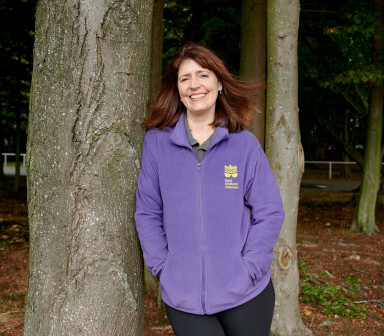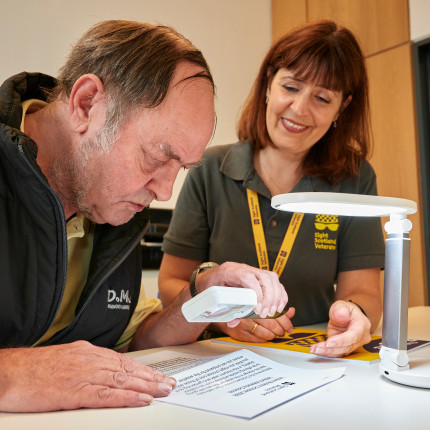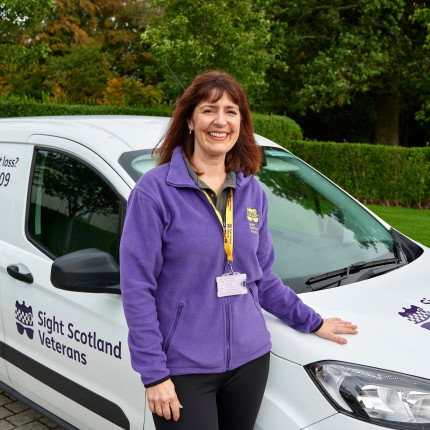It’s no wonder that our wonderful Rehabilitation Officer Katrina Campbell enjoys her role, because for the last five years she has been improving the quality of life for veterans who have lost their sight.
Katrina has been with Sight Scotland Veterans since September 2017. It was an important time Katrina to join us, as it coincided with the opening of the new centre in Paisley, the Hawkhead Centre.
Katrina attends the centre, works from home and goes on home visits helping people with visual impairments, who have served in the Armed Forces at any point in their lives. She, and the rehabilitation team, provide a whole range of practical and emotional support.
Many of the people Katrina visits are at the beginning of their sight loss journey and feeling alone and isolated.
But Katrina, and her colleagues at Sight Scotland Veterans, step in and help them to gain their own independence again.

Katrina said that “A former colleague I worked with a Falkirk Council went to Sight Scotland Veterans years ago, and always spoke about how it was expanding and developing new services, it sounded amazing.”
Visiting veterans in their home and seeing many of them struggling can take its toll on Katrina, but she knows that over time, with help from the charity, they will regain the ability to enjoy many of the things they loved doing, before losing their sight.
Katrina explained: “Sight loss can happen to any of us – and it can happen overnight.
“I love my job, it’s absolutely fabulous, and every day is different.
“I visit people in their home and conduct an assessment, to identify what they are struggling with and how they can take control of their lives again. Our aim is to help them to get their independence back.
“To see people who became trapped in their home and get their life back and take control of the situation is the best part of my job.”
As one of Sight Scotland Veterans’ rehabilitation officers, it is also Katrina’s job to distribute life-changing equipment and demonstrate how it works, as well as training those newly diagnosed with sight loss how to walk with a white cane.
She added: “We are fortunate at Sight Scotland Veterans because we have a very healthy equipment budget, so can provide handheld magnifiers and electronic magnifiers that take away colour contrast and glare, to big television screen that help people to read their mail. The screen displays information about hospital appointments or bank statements so they no longer need to rely on a neighbour or wait until the end of the week until a family member visits.
“There are so many different things we can issue, but one of my favourites it a simple magnifier with a built-in light that is the size of credit card, and veterans can carry it in their pocket.
“We also issue synaptic mobile phones - they are so clever- they can be used as an electronic reader or magnifier and they even have a colour detector so can check what colour of shoes they have put on.”
Most people take time to adjust to a ‘blindness’ or visual impairment diagnosis, Katrina explained, so it is important that they are given the help they need as soon as possible.

"And those who have lost their sight soon discover, there is very little they can’t do that they used to be able to do, apart from driving. It’s all about finding a different way of doing things"
Katrina knows the significant impact sight loss can have on people and their lives, as well as the lives of their family members. She explained: “It is a terrible shock to the system to receive the news from your ophthalmologist that there is nothing more they can do, and that you will need to be registered blind.
“It is like a bereavement – because you go through similar stages: denial, anger, grief and then acceptance.
“Being visually impaired can be very lonely, as friends and family will never know what you are going through on a daily basis – we actually work with families to give them a taste of visual impairment and ask them to wear glasses for the morning that would replicate what someone with diabetic retinopathy would see. These glasses have a number of patches on the lens.
“When we do our assessments, people realise they are not alone, and we will be with them through the journey.
“And those who have lost their sight soon discover, there is very little they can’t do that they used to be able to do, apart from driving. It’s all about finding a different way of doing things,” added Katrina.
Sight Scotland Veterans is there for anyone who has served in the Armed Forces and has lost all, or part of, their sight – whatever the reason. Veterans who already benefit from the charity by attending one of the centres, speak of the camaraderie, the inter-service banter and the lack of judgment.

Do you or does a veteran you care for need support
Get expert advice and practical help for yourself or a veteran you care for by completing the form below or calling the number at the top right of your screen. Our freephone line is open for calls 10am - 4pm Monday to Thursday and 10am - 3pm Friday.